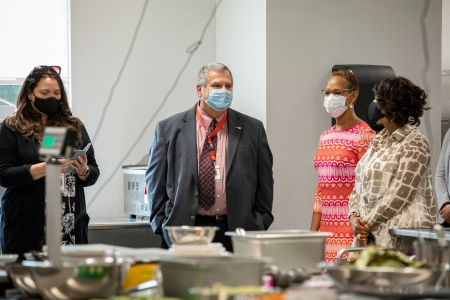NCFIL Executive Director’s Perspective: September 2021

NCFIL Facility + Business Update
The NC Food Innovation Lab is fully operational and quite busy. Our project portfolio is well-balanced, with projects covering many of our core technical disciplines. When we designed our facility three years ago this month, our strategy was to align our capabilities around core disciplines for both the Pilot Plant and Product Development Lab.
- Product Development Lab competencies: Bakery, Beverages, Confections, Snacks, Meat Alternatives, Dairy Alternatives and Processed Meals
- Pilot Plant competencies: Drying, Extrusion, Extraction, Thermal Processing and Milling/Blending
Extraction + Extrusion On the Rise
The last six months have been very busy in the dairy alternative beverage category. As we approach autumn, we anticipate continued activity there and also in extractions and extrusion, which are rapidly populating our project portfolio. We’ve added new personnel and are setting our sights on several more experienced food scientists and interns. Our summer interns did a fabulous job in developing new products and assisting in the Pilot Plant.
Classes Coming Soon
We also hope to offer in-person classes and training later this fall, dependent on the pandemic. It is difficult to train people in webinars or via Zoom meetings. We can provide information, but nothing replicates the value of hands-on training, especially to learn the little nuances. We’re in the process of developing a strategy for course and training options; if you have any ideas, we welcome your input.
On the Product Launch Pad…
Since June, we have assisted clients in several product launches and currently have seven more products on the launch pad. NCFIL personnel will work closely with our clients to identify co-packers and co-manufacturers who will entertain small volumes for entrepreneurs to launch products. In a few instances, NCFIL personnel are onsite in initial production runs to confirm the protocols and processes we have developed are followed to ensure the highest quality products.
Director’s Perspective
I recently attended the SNAXPO 2021 show in-person with our Economic Development Partnership of North Carolina (EDPNC) partners. Show attendance was lower than past years as the struggle with COVID disruptions and inconveniences continues, but there were three topics of concern that nearly every company I spoke with discussed. We have written about these in past issues of this perspective and several blogs, but they continue to plague our industry 18 months into the pandemic. We also added a fourth that will impact our industry this autumn.
Here are my perspectives on these topics:
#1 Supply Chain Challenges
All companies are experiencing continued shortages of ingredients, packaging materials, equipment and spare parts. This week McDonald’s ran out of milkshakes in the UK! Maybe there is an opportunity for a good plant-based shake?
Early in the pandemic, many companies learned to have back-up plans if their primary suppliers were disrupted. Current challenges are that secondary and tertiary suppliers are also crippled by transportation and employee interferences. Our ports are seeing shipping container shortages as many are filled with products that cannot move from receiving locations into commerce due to a continued shortage of truck drivers. This problem continues to persist and must be addressed by regulators.
#2 Employee Shortages
The United States workforce has been under pressure for many years, but the pandemic exacerbated a tenuous situation. As the Delta and Lambda COVID variants infect clusters of our population, it causes random instances of employee shortages as people get sick or have fear of getting sick. Furthermore, many lower paid employees have left the workplace as unemployment benefits were extended, or they are seeking jobs where they can work remotely. This is often not conducive for the food industry.
#3 Rising Prices of Raw Materials and Packaging
The laws of supply and demand are in full exemplary view throughout the food supply chain. If products or packaging have not been affected by supply chain challenges, suppliers have taken advantage of the demand by increasing their prices. Wholesale prices have risen nearly 8% in the past 12 months, and core inflation is up 6.2%. Food processors and retailers are passing some of these costs on to consumers.
As fresh fruits and vegetables entered the market the past two months, we have seen food prices drop 1.2%, but we are now facing autumn and another factor I’ll add below.
One More Factor…The Weather
We have just experienced the hottest month on record in the United States, and August is also shaping up to be very hot. Crop yield forecasts are being reduced almost weekly as crops are stressed in this heat. Top this off with the current devastating fires in the west and the peak months for hurricane season. Food prices will be on the rise once more.
Growth Despite Challenges
Despite these challenges, the food industry continues to develop and launch new products across all categories. The plant-based food sector is growing at rates faster than animal products, and the forecasted growth numbers continue to be favorable.
Thank you for reading this month’s perspective. These are the views and opinions of the NCFIL Executive Director and may not reflect the opinion of others at NC State. Let’s discuss how the North Carolina Food Innovation Lab can work with your company to develop and launch new plant-based foods.
- Categories: